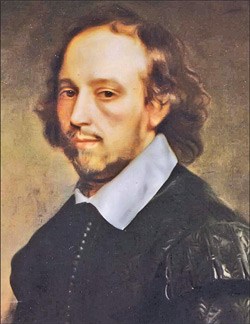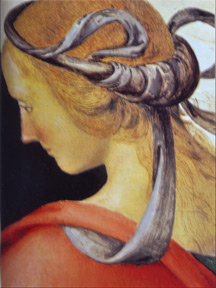|

The portrait of William Shakespeare painted during the reign
of Charles II |
William Shakespeare:
‘Two loves have I’
by Gwen Herat
[ Part 2]
Shall I compare thee to a summer's day
Thou art more lovely and more temperate
Rough winds do shake the darling buds of May,
And summer's lease hath all to short a date.
Sometimes too hot the eye of heaven shines;
And often is his gold complexion dimmed ... XVIII
Apparently the Bard compares his best days as a paragon of youth but
lays his feelings on one young nobleman and also on a woman but finds
him lovelier and milder than the often punishing days of summer. But,
later he changes his mind in the latter sonnets.
The young man's good looks will endure as the eternal summer keeps
fading only to come back later.
His youth will endure forever as the sonnet. How right he was because
centuries later it is still temperate and awaken our minds to shower
praise on it. And Shakespeare questions, ‘shall I compare thee to a
Summer's day?’ and contrary to thinking, he is different. His love is
not measured against summer but summer is measured against a lover.
Who is this lover; obviously the Earl of Southampton.
We have to lean more on sonnets to find his inner feelings. He never
confessed any feelings to anyone but there came a time that his mind nor
soul could cope up the tensions within and he had to bear it out. So, he
poured them into sonnets, confusing the reader about a young
good-looking nobleman and the Dark Lady. We still do not know whether
both are the same person on whom he lavished his ardour. But we do know
the nobleman to be the Earl of Southampton. Yet, the Bard pours out his
heart as though on a beautiful woman.
‘Let me confess that we two must be twain
Although our undivided loves are one
So shall those blots that do with me remain
Without thy help, by me borne alone
In our two oves there is but one respect
Though in our lives a seperable spite.... XXXVI
The Dark Lady
Surely, he is not referring to Anne Hathaway. Then, who is it? The
Dark Lady or the earl of Southampton? During Shakespeare's time, any
book that was printed was entered upon on a list known as the
Stationer's Register. In April of 1593 Shakespeare's poem, Venus and
Adonis was entered by its printer, Richard Field who was a Stratford man
like the poet who had made a successful move to London. They clicked
very well as a combination but The rape of Lucrece was registered on May
9 1594 by another printer called John Harrison. Both poems were
dedicated to a young nobleman, Henry writhesley, Earl of Soyhampton who
was rich, dashing and influential. Why?
Let's find out.
Shakespeare was swept off his feet by his looks and passions aroused.
Shakespeare tried hard to win his patronage as well as his affection.
Getting a patron meant getting some financial support and an influential
friend. The dedication to the young earl follows the fashion of the time
and they exaggerated his high position making the poet very humble.
Shakespeare's sequence is not conventional as we find his expressions in
sonnet when he describes his mistress’ eyes, lips, breast and hair but
turn on his heels to express that the ideal mistress should be
white-skinned, blonde and red-lipped and like Juliet, blessed with eyes
rivalled the sun. However, with the Bard the situation is not that easy
to the extent there is any kind of story. The poet's two loves both in
the sense of persons whom he loves with an intense friendship with the
man as in sonnet XX where homosexual interests is disapproved. But a
sexual relationship with a woman of whom he speaks in harsh terms and
with disgust but indicate that man and woman seem to get together to
betray him.
Marriage
One reason that Shakespeare's marriage never brough him happiness is
that he was very disdainful of women. He considered the whole lot to be
vain, proud, deceitful, murderous, homicidal, suicidal, unfaithful,
betraying as most of his plays and sonnets reveal.
|

My mistress’ eyes are nothing like the sun/Coral is far more
red than her lips red/
If snow be white, why then her breasts are dun/ If hairs be
wire, black wires grow on her head (Sonnet 130) |
Did that make him gay or homosexual? One reason is that he showered
his affections on a young nobleman. Shakespeare never let himself down.
Whatever the cause was, he left it in mid-air and today, scholars are
still investigating.
In Sonnet 98 he complains; ‘From you I have been absent in the spring
but in a man's absence, the poet feels no such feel, ‘As with your
shadow I with these play'.
In trying to connect all elements, he is caught with his pants down
with the central problem arising from his affections to The Dark Lady
and a young man.
The poet faces more dliemma that the more his imagination dwells on
the young man, he risked dissolving into an image which became merely
imaginary. Other sonnets sequences tend to be addressed to women so
idealised that virtually ceases to be flesh and blood.
His changeable nature set against her perfect immutability. Still on
the face of all these and others, he denies his homosexual leanings even
if it was in the case of a single person's affection; that of the Earl
of Southampton. My guess is that even the Dark Lady was a man.
I can go no further. He has also confused me. |

